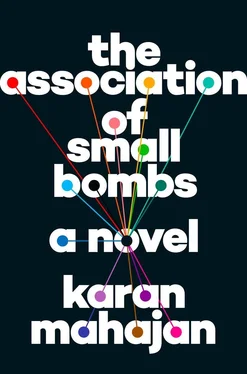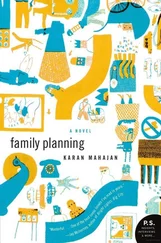“Wa aliekum as salaam,” Mansoor said.
________
Mansoor liked that the man did not press him, but it was also one of many encounters during a sullen winter and he did not make much of it. Instead, at home, Mansoor focused on coaxing his injured limbs to life, dipping his arms in alternating casseroles of hot and cold water and pulling up his sweater sleeves, his feet feeling cuffed to the marble floor. When he doused his arms in the water, his back ached; his body parts jostled and screamed for attention. When one part improved, the other took on the mantle of pain. Jaya explained that the computer, because of the intensity of attention it demanded, turned the muscles into hard microchips.
He was in the middle of this ritual when he got a call from his friend Darius.
Darius had been a schoolmate of Mansoor’s, but not someone he’d been particularly close with — whom had he been close with? — and so when Darius came on the phone, Mansoor was oddly excited.
“How are you, Mansoor?”
“Fit, yaar,” he said, turning back into the anxious-to-please second-tier-popular student he’d been in school.
They talked for a while about an elderly art teacher who had recently died of a stroke — she was a chain-smoking radical leftist who had made them paint antinuclear signs (INDIA: NO CLEAR POLICY) for half a year after the Pokhran tests — and then Darius said, “So I’m calling because you met my friend Naushad.”
It turned out that after a year at St. Stephen’s studying history, Darius had become an activist. “Anyway,” Darius went on, “he told me about his idea of getting you involved and I think it would be excellent. In fact I had told him about you at one point but I didn’t know you had come back to Delhi.”
Mansoor felt a dip in his mood. “Yaah, it’s a health issue.”
“Anyway,” Darius said in his unhearing way, “it’s a great group of people, very smart, and you’ll like Tara, who runs it. A Dipsite but she’s very eloquent. Anyway, I think these people are making quite a bit of difference. Wouldn’t hurt to come for at least one meeting.”
________
Mansoor didn’t want to go, but he had never really learned to say no, even after what had happened in the market with the Khurana boys, and so, on a rainy afternoon, he went over to the nursing home in Defence Colony where the group met — Tara’s mother, a doctor, ran the hospital.
The nursing home was a wide dish of a building smarting of disinfectant; the smell seemed to have struck dead the stunted palms in the front. Shivering, Mansoor climbed the stairs past the rooms with their sounds of conspiring patients and came to a bare room full of men and women sitting cross-legged in a circle. “You can sit down anywhere,” a woman said, her sharp canines visible. She was attractive, in a fair vampirish way, and must have been Tara.
Darius and Naushad got up and introduced Mansoor, who put his palms together, like a politician.
There were twenty people in all, most of them his age, some wearing checked shirts and pants, the women in modest salwar kameezes, a few heads dotted with skullcaps, gol topis, the Muslim women identifiable by their coquettish pink head scarfs.
Tara, after a brief explanation of what the group did — she said it had first formed in response to the anti-Muslim riots in Gujarat earlier that year — asked Mansoor to speak. He suddenly became confused about why he was there. “I actually don’t know that much about the blast. I was quite small when it happened.”
“But you were hurt, right?”
“I was injured. And that’s why I’ve come back, for treatment. The bigger issue was that my two friends died.” The room hushed; Mansoor hadn’t mentioned this to Naushad — nor, apparently, had Darius, who, like many people Mansoor knew, had forgotten the aching detail of the two dead boys. The bomb survived through the living, not the dead. “Tushar and Nakul Khurana,” Mansoor said, savoring the Hindu names in this secular atmosphere. “I’d gone with them, and when the blast happened, near the framing shop, they died instantly. I had to run back all the way to my house in South Ex.” Sensing that people were impressed, he went on. “I was in a lot of pain — even my fillings in my teeth had fallen out — and I also felt a lot of guilt, even though I think they died instantly. I was twelve. I’m not sure what I could have done.”
“Poor boys,” one woman said, shaking her head.
“Yaah, but what’s more horrible is that other innocents are suffering,” Mansoor said, suddenly finding the thread. “That’s why I came.”
The group filled him in on what, exactly, they’d achieved with regard to the 1996 blast. Through filing petitions and engaging public litigation lawyers, they’d managed to bring the case before a board that dealt with TADA and POTA cases. They were also selectively targeting corrupt policemen who arrested former informers and innocent Kashmiris whenever there was a terrorist event. “The police aren’t happy about that, and they’re going to come after us,” a man named Ayub said, clearly looking forward to this drama. He seemed like one of the leaders of the group — a tall man with impervious dark skin, sandy hair, and an unplaceable class background, though Mansoor assumed he was lower class. “But the thing you can do for us,” Ayub went on, “is write petitions and editorials. You know, the hardest thing in this media environment is getting a word in the papers or the press. But someone like you, eloquent, studying abroad, a nonthreatening Muslim — people will be interested to hear what you say.”
Mansoor wasn’t sure if he should be flattered by the word nonthreatening , but he straightened his posture and looked at Tara, who was picking at her bare feet, the heart-shaped frond of hair on the top of her head visible, crisscrossed by several partings.
Everyone but Mansoor was barefoot in the cold room, with its single bed pressed against the wall, suggesting it had once been a guest room. The shelves were empty except for weirdly out-of-place religious tomes in Sanskrit, bound in red. “I can consider that,” Mansoor said, though he instantly tensed up, thinking of what the Khuranas and his parents would say.
________
At the end of the meeting, Tara and Ayub came up to him.
“So you’re based in the U.S.?” Tara asked. Ayub stood a little behind her, smiling.
“Yeah.”
Tara said she had studied abroad too, at Carnegie Mellon, where she’d majored in psychology. “What I loved about the U.S. was how open it was to the humanities. I would not have developed any consciousness had I not gone there.”
He liked how unpretentious she was. “Me as well.”
Ayub now stepped forward. “How long are you in Delhi?” he asked.
“A few months,” Mansoor said, standing up on his toes; Ayub was taller than him.
“Then you should come with me tomorrow,” Ayub said.
________
The wives and mothers of the accused had long since moved to Delhi from Kashmir to lobby for their husbands’ or sons’ release, and so the next day, setting off with his driver, Mohammed, Mansoor picked up Ayub from outside Tikona Park and they drove together to a small alley in Batla House overflowing with mud and gravel smeared on the ground from abandoned construction. At the far end of the alley, schoolboys, twelve- and thirteen-year-olds, poured out of an unfinished concrete building in their tired school uniforms, their socks drooping, their bags like the surreal burdens of soldiers. Their presence in the alley created an alertness, an impression of a herd of blind, ambling animals, of uncontrolled life, and for a second Mansoor was nostalgic for his school days. But looking at the boys again, their smallness, their jutting confidence, their scramble of limbs — restless, pumping, pointing, shooting everywhere, gesticulating for no reason, grabbing cones of chana from each other — their tense flowing energy, the symphony of gestures, all this filled him with fear and sadness: how ill equipped one was to deal with pain at that age! The ghosts of Tushar and Nakul flashed through the crowd: fat and thin, retiring, sharp. All crowds of a certain age contained them. Mansoor found himself praying for these poor Jamia schoolboys.
Читать дальше












